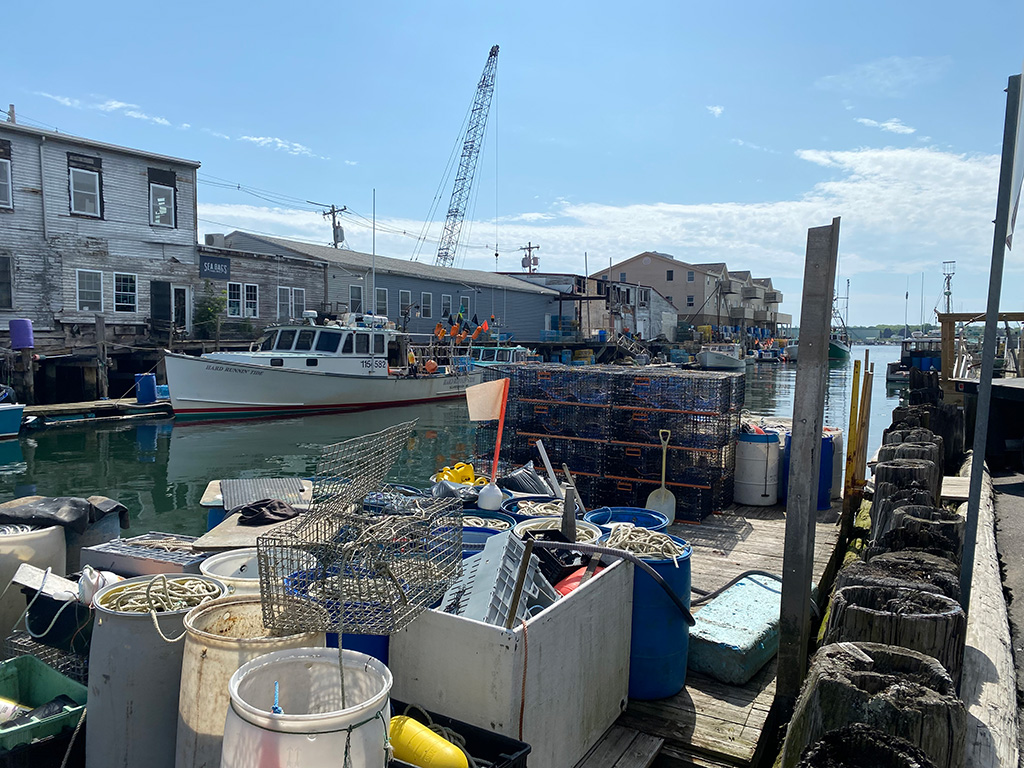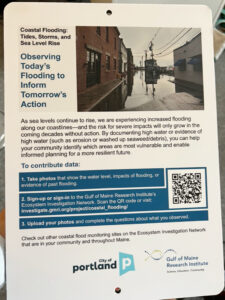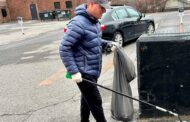Sea level rise will threaten the future of Portland’s working waterfront. Today, we can help document the change as it happens to inform tomorrow’s resiliency plans.
By Tony Zeli

Walk the Working Waterfront is an annual self-guided tour celebrating and focusing attention on the city’s coastal culture. This year, on June 8th, the tour along Commercial Street will also focus attention on sea level rise and its impact.
“Portland is uniquely positioned because we still have a working waterfront… We chose decades ago to preserve what we have today,” says sustainability associate Katie Tims. Katie helps to organize community engagement for the Portland Sustainability Office.
This year is the 9th annual Walk the Working Waterfront. And it is the first year the City has stepped up to take a leading role. The City is working with the Maine Coastal Program, the Gulf of Maine Research Institute, and the Waterfront Alliance. In addition to supporting the diverse businesses and stakeholders of the waterfront, this year’s walk will include documenting and discussing sea level rise.
Vulnerability to Sea Level Rise
Portland and South Portland have a joint climate action plan (One Climate Future). Part of that plan is to ensure that the cities’ ports and waterfronts can respond and adapt to new climate stresses.
As Katie notes, coastal flooding and coastal resilience planning has become a more pressing and visible concern, particularly after the devastating back-to-back storms in March and April that wreaked havoc along Maine’s coastlines. It was a reminder for the state and city that we need to build for climate resiliency. “I do think we are going to have to think innovatively about the ways we continue to maintain our infrastructure and think about things that are going to keep getting wet.”
The Cities of Portland and South Portland published a Climate Change Vulnerability Assessment in 2019. It takes a sobering look into potential sea level rise and its street level impacts. Looking toward 2050, Portland commits to managing an “intermediate scenario” of 1.48 feet of relative sea level rise, and is preparing to manage an “extreme scenario” of 3.38 feet. You can explore scenarios yourself with Portland’s Projected Coastal Flood Risk Interactive Web Map.
Coastal Flooding Community Science Project

You can help document sea level rise by sharing your own observations through the Gulf of Maine Research Institute’s Coastal Flooding Community Science Project. You can start your journey as a citizen scientist with an introduction during the walk. Interspersed along Commercial Street will be three posted signs inviting you to share your pictures and observations. This data will inform future decisions and priorities.
“Observations can be personal, too. If it’s affecting something that people care about that is still a really important part of data collection,” says Katie. “This program is fantastic for involving people in not only gathering that data, but informing the efforts we’re going to be taking to protect our infrastructure… It’s not just boring science data collection, it’s engaging with citizens on the actual process of how to plan and prioritize decisions that are going to be made at a higher level.”
By June 8th, there will be signs at Moon Tide Park, Bell Buoy Park, Portland Pier, and Widgery Wharf. Plus, the City plans to post more signs across the waterfront sometime this summer.
Data Collection Continues…
The data collection continues all year long, not just during the most impactful weather events. Groups of citizen scientists will often go out and document king tide events, and the media covers the big storms and major damage. But tidal flooding, the temporary inundation of low-lying areas, is usually not severe enough to alert the media. However, so called sunny day flooding often causes road closures, leads to minor property damage, and strains stormwater systems. It’s important to document sunny day flooding, too.
Walk the Working Waterfront – June 8th
Katie and the Portland and South Portland Sustainability Offices will be available during the walk to answer questions at Buoy Park.
“I love city events where people get really excited and bring the whole family out. It’s a really participatory and hands on fun event,” says Katie.
Learn more about Portland and South Portland’s climate action plan at Oneclimatefuture.org.





